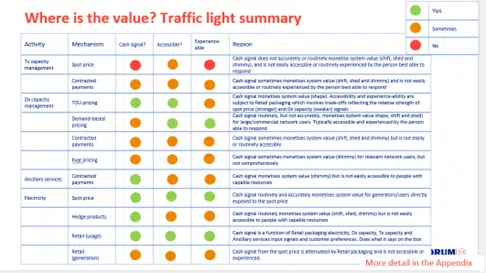Back in late September and early October FlexForum Members considered the practical implications of the flexibility-related solutions put on the table by the Energy Competition Taskforce, focusing on the opportunity to fill the holes in the value stack we found earlier in the year.
The two workshops raised a bunch of questions, particularly about the solutions to require distributors to pay a rebate when consumers export electricity at peak times, require retailers to offer a time-of-use pricing and to require retailers to better reward consumers for supplying power. We shared everything with the Electricity Authority, including several fundamental questions left hanging. These questions, which go to the heart of the workability and impacts of the solutions include:
Members came back for more on 19 November to identify what solutions FlexForum would suggest to fill those value holes. About 30 people from across the ecosystem turned out for a healthy conversation about:
Sorting out the value stack is critical to people saying yes to flex and maximising the potential for flexibility to avoid a decent chunk of the $300 billion which people and the power sector are estimated to spend next 25 years to 2050 on generation and network infrastructure to replace fossil fuelled gear.
Efficient pricing across the value stack requires a cash signal, that is accessible, and experience-able. As a Member said, ‘Cash is king. Good place to start.’.
We proposed a hole in the value stack can be called filled when Yes is the answer to each of these questions.
It’s a pretty complex area, and the conversation suggested refinements to make the 3 questions clear, but Members reckoned the traffic lights broadly aligned with their lived experience.

We will be refining and elaborating on our thinking in the coming weeks. However, at first blush, the questions and approach give a pretty clear steer about where to focus effort to fill holes in the value stack to enable people and the electricity sector to maximise the value of flexibility and deliver a more affordable, reliable and resilient and sustainable power system and economy.
Get in touch to tell us what you think: info@flexforum.nz
